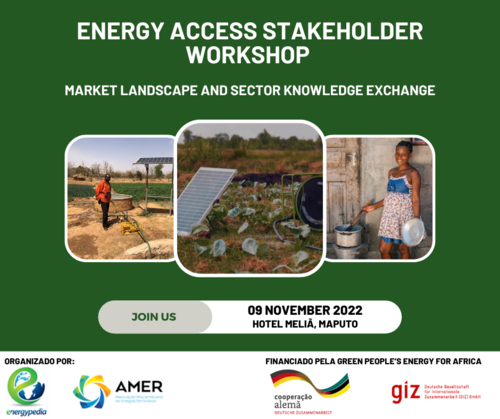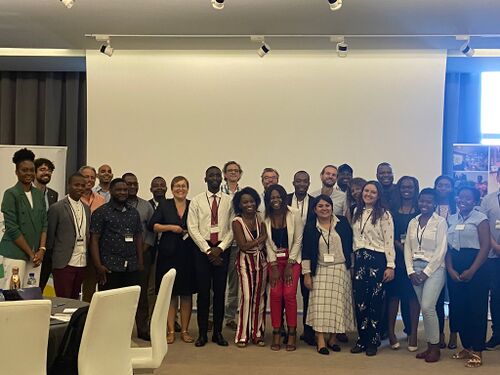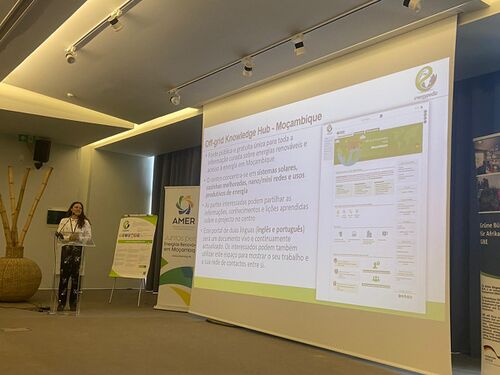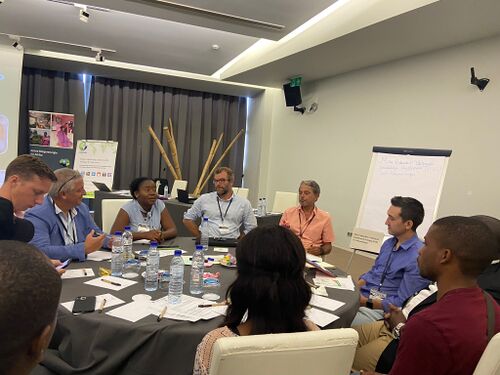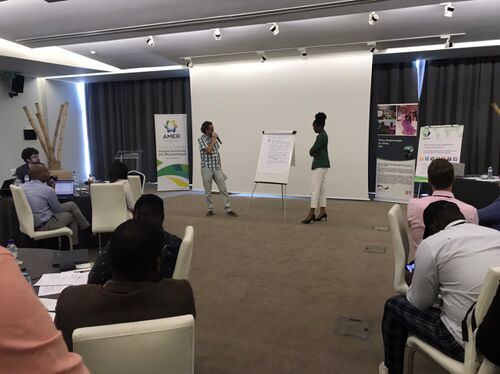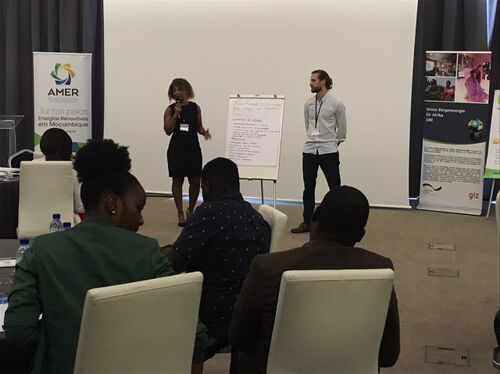Difference between revisions of "Energy Access Stakeholder Workshop in Maputo"
***** (***** | *****) m |
***** (***** | *****) m Tag: 2017 source edit |
||
| (19 intermediate revisions by the same user not shown) | |||
| Line 1: | Line 1: | ||
| − | + | {{Back to Mozambique Portal}} | |
| + | {{Portuguese_Version|Energy_Access_Stakeholder_Workshop_em_Maputo}} | ||
=== Background === | === Background === | ||
| − | + | [[File:Banner_EN.png|alt=|center|500x500px]] | |
| − | |||
| − | |||
| − | + | Energypedia together with our partner, AMER organised an in-person event for the energy access sector in Mozambique. This event aimed to bring the off-grid energy sector together to discuss on key issues and opportunities. This event was community driven i.e. a pre-event was held to bring the community together in an online meeting held the 1<sup>st</sup> of November 2022, where they had the possibility to share their views on the needs of the sector and propose the topics to be discussed during the in-person event. | |
| − | Energypedia together with our partner, AMER organised an in-person event for the energy access sector in Mozambique. This event aimed to bring the off-grid energy sector together to discuss on key issues and opportunities. | ||
| − | The Energy Access Stakeholder Workshop, held the 8th of November 2022, had in total 27 private sector representatives (from both solar technologies and clean cooking), who were divided into three working groups to discuss on '''productive use of energy, end-user financial mechanisms, and strategies to reaching last-mile consumers'''. These topics were selected based on the survey results from past webinars held by energypedia and the guiding questions were reviewed by the participants during the online meeting the 1st of November. | + | The Energy Access Stakeholder Workshop, held the 8th of November 2022, had in total 27 private sector representatives (from both solar technologies and clean cooking), who were divided into three working groups to discuss on '''productive use of energy (PUE), end-user financial mechanisms, and strategies to reaching last-mile consumers'''. These topics were selected based on the survey results from past webinars held by energypedia and the guiding questions were reviewed by the participants during the online meeting the 1st of November.[[File:Moz event.jpg|thumb|500x500px|Energy Access Stakeholder Workshop in Maputo|alt=|none]] |
| − | + | ===Stakeholder Workshop=== | |
| − | This article presents a summary of the topics discussed in each roundtable. | + | The Stakeholer Workshop kicked off with welcome remarks from energypedia, AMER and GBE. It was then followed by a short presentation from energypedia on the current market landscape for the solar and clean cooking sectors. The aim of the presentation was to provide up-to-date information and a common understand of the two sectors as we had audience from both of them. Energypedia also showcased the [[Mozambique Off-grid Knowledge Hub]] and how the participants could contribute to the hub. Examples of case studies from different companies were shared to encourage other companies to share theirs and join the hub. During the second part of the workshop, the audience was divided into three working groups to discuss the three topics. At the end of the roundtable sessions, the representative of each round table presented the results to the whole audience. |
| + | [[File:Energypedia.jpg|thumb|500x500px|Presentation of the Mozambique Off-grid Knowledge Hub by Energypedia|alt=|none]] | ||
| + | This article presents a summary of the topics discussed in each roundtable. | ||
| + | ===='''Round Table 1: Productive Use of Energy (PUE) in Mozambique'''==== | ||
| + | [[File:Round Table 1.jpg|thumb|500x500px|Round Table 1: Discussion about productive use of energy|alt=]] | ||
| − | |||
'''Moderation''': | '''Moderation''': | ||
| Line 21: | Line 22: | ||
'''Discussion''': | '''Discussion''': | ||
| − | Abuchamo Dário Maputo – GetInvest | + | Abuchamo Dário Maputo – GetInvest |
| − | Samson Jangaia – Sun Power | + | Samson Jangaia – Sun Power |
| − | Edvânia Ana Paulino D'Uamba – Logos Industrias | + | Edvânia Ana Paulino D'Uamba – Logos Industrias |
| − | Leusio Maungue – GIZ | + | Leusio Maungue – GIZ |
| − | João Paulo Zimba – Burn | + | João Paulo Zimba – Burn |
| − | Charle Wilkinson – Arc Power | + | Charle Wilkinson – Arc Power |
| − | Joaquim Magalhães – Arc Power | + | Joaquim Magalhães – Arc Power |
| − | Cedrick Lemarie – Epilson Solar | + | Cedrick Lemarie – Epilson Solar |
| − | Miguel Sottomayor – | + | Miguel Sottomayor – AMER |
Ana Dionência Munguambe – Energypedia | Ana Dionência Munguambe – Energypedia | ||
| + | |||
| + | At the beginning of the panel discussion, the moderator gave a brief introduction of the definition of productive use of energy (PUE). PUE is today a concept involved in the energy process world, by industry leaders, financiers and civil society organisations and many others. But what is the real meaning of UPE? Unfortunately there is no clear industry definition of what is productive and what is not productive. | ||
| + | |||
| + | [[Productive Use of Electricity|The conventional definition of PUE]] assumes that there are no technologies suitable for domestic, community, health, education or consumptive use. In short, PUE is a technology used in agriculture, industry and commerce to generate income, goods and services. But, if income generation is a primary objective of PUE, new data emerging in the sector suggests that many other technologies should qualify. | ||
| + | |||
| + | Lighting, which we can simply define as access to electricity can be used in income generation. Current data supporting this hypothesis, such as the recently retired 2018, Paul in Opportunity from Gugla, states that access to electricity has already enabled an increase in income between USD 35 per month, an income increase for a third of their SHS customers. In that sense, is a light bulb that allows a stall to stay open for a long time considered productive use of energy? And is the fan that is used to provide comfort in that stall also productive use of energy? What about an improved cooker? What about an oven? These were the questions posed to the participants of Round Table 1 by the moderator with the intention of coming up with a definition for PUE. | ||
| + | |||
| + | An initial comment was that we must know the limit between self consumption (own consumption) and PUE, only then we can properly define what it is. We must keep in mind that PUE has the purpose of generating income/profit, and self consumption does not. For example: a light bulb that is lit in a family home would be considered self consumption, but a light bulb in a stall, generates income, therefore it is PUE. Under this argument, any form of energy that is used to generate income would be considered PUE. | ||
| + | |||
| + | There was also the opposing argument that one should not separate PUE from self consumption, as both concepts end up flowing into the same goal. This argument rose the following questions: is it possible to determine the minimum category or power for a system to be considered PUE? Would a single consumer who uses a PV system at an industrial level be considered PUE or self consumption? | ||
| + | |||
| + | Other following comments were: | ||
| + | |||
| + | *PUE is the process of production, income generation, benefits and employment generation. | ||
| + | *The term PUE arises from the use of solar energy, with the aim of ending poverty and comes to assume the part of sustainability. | ||
| + | *PUE serves to distribute wealth and that it is a term that benefits people directly or indirectly. | ||
| + | |||
| + | The participants were of the opinion that we speak of PUE we have to consider the following thoughts: | ||
| + | |||
| + | * there is a need to address the issue of licensing, | ||
| + | * it is related to increasing energy production, | ||
| + | *it helps creating gradual development that can satisfy the needs of customers, | ||
| + | *it is related to following a value chain, | ||
| + | *there is a need to design access to productive use | ||
| + | * there is a need to convince the government to promote productive use of energy, | ||
| + | *there is a need to see the scale of energy use. | ||
| + | |||
| + | The discussion concluded with a presentation of the most important points to the rest of the participants of the workshop. | ||
'''What comes to mind when you hear “Productive use of energy”?''' | '''What comes to mind when you hear “Productive use of energy”?''' | ||
| − | * Self-consumption | + | *Self-consumption |
| − | * Scaling benefits from individual to groups | + | *Scaling benefits from individual to groups |
* Generation of money | * Generation of money | ||
| − | * User profile and production | + | *User profile and production |
* Creating jobs | * Creating jobs | ||
| − | * Value chain | + | *Value chain |
| − | * Distribution of wealth | + | *Distribution of wealth |
| − | * Today vs tomorrow | + | *Today vs tomorrow |
| − | * Production vs Consumption | + | *Production vs Consumption |
'''Benefits:''' | '''Benefits:''' | ||
| − | * Community development | + | *Community development |
| − | * More oportunities for businesses and employment | + | *More oportunities for businesses and employment |
| − | * Financial equality - equal financial return for the community | + | *Financial equality - equal financial return for the community |
'''Challenges:''' | '''Challenges:''' | ||
| − | * Dependence on subsidies for financing | + | *Dependence on subsidies for financing |
| − | * Limited capacity leads to a slow return of investment | + | *Limited capacity leads to a slow return of investment |
| − | * Technological distinction - different definitions for "productive use" | + | *Technological distinction - different definitions for "productive use" |
| − | * | + | *Lack of knowledge / capacity building in the following areas: |
| − | ** Technical | + | **Technical |
| − | ** Entrepreneurial | + | **Entrepreneurial |
| − | ** Sharing information on what technologies are currently in existence | + | **Sharing information on what technologies are currently in existence |
| − | ** Outreach of opportunities in the field | + | **Outreach of opportunities in the field |
| − | * | + | *Low technical quality assurance |
| − | * A more specific regulatory framework | + | *A more specific regulatory framework is needed |
| − | '''Recommendations:''' | + | '''Recommendations for AMER as an association in the renewable energy sector in Mozambique:''' |
| − | * Promoting knowledge and capacity building | + | *Promoting knowledge and capacity building |
| − | * Promoting PPP instead of PUE to benefit communities over individuals | + | *Investing in infrastructure that favors productive use |
| − | * Defining what PUE is in a national context | + | *Promoting public-private partnerships |
| + | *Promoting PPP instead of PUE to benefit communities over individuals | ||
| + | *Defining what PUE is in a national context | ||
| − | ==== '''Round Table 2: End-user financing mechanisms''' ==== | + | ===='''Round Table 2: End-user financing mechanisms'''==== |
| + | [[File:Roundtable 2.jpg|thumb|500x500px|Round Table 2: Presentation of results from the discussion about end-user financing mechanisms|alt=]] | ||
'''Moderation:''' | '''Moderation:''' | ||
| Line 102: | Line 134: | ||
Tevine Gregorio Eugenio - energypedia | Tevine Gregorio Eugenio - energypedia | ||
| + | '''What are the products and services sold by the companies in the round table?''' | ||
| − | + | *Solar Home System | |
| − | + | *Solar system for irrigation and for productive use in general, | |
| − | + | *Improved cook stoves (charcoal and firewood) | |
| − | |||
| − | Solar Home System | ||
| − | |||
| − | |||
| − | '''ENGIE'''-PAYGO, ARREARS (High end segment); '''PLATINA''' Ltd- fixed installments, financing through bank and microfinance; '''AGRECOA'''-Cash-direct discounts, Subvention from donors such as FAZER; '''MOZCARBON'''-Monthly installments, 3 in urban areas and 6-12 in rural areas, Carbon Credit, they advance two customer incentives (RBF and Carbon Credits); '''PRATICA FOUNDATION'''-Subsidy to companies who distribute solar pumping to the end user. (direct aid, installment, RBF, CovidPlus, cash) | + | '''What are the fiancing options offered by your company?''' |
| + | # PAYGO - client pays as they can, if they get delayed the duration of their contract is prolonged | ||
| + | #arrears - delayed payments. This payment system is suited for clients that are more able to pay in the high end segment | ||
| + | #No disconnections - Hybrid payments with several options, such as: financing through banks/micro-financing, mobile payment | ||
| + | #flat-rate services payed with cash at a subsidised price - present in cookstove businesses | ||
| + | #Offer financial incentives to clients: | ||
| + | #* RBF | ||
| + | #*Carbon Credits | ||
| + | #Monthly installments | ||
| + | #Other incentives, such as subsidies to companies who distribute productive use equipment to end users | ||
| + | ('''ENGIE'''-PAYGO, ARREARS (High end segment); '''PLATINA''' Ltd- fixed installments, financing through bank and microfinance; '''AGRECOA'''-Cash-direct discounts, Subvention from donors such as FAZER; '''MOZCARBON'''-Monthly installments, 3 in urban areas and 6-12 in rural areas, Carbon Credit, they advance two customer incentives (RBF and Carbon Credits); '''PRATICA FOUNDATION'''-Subsidy to companies who distribute solar pumping to the end user. (direct aid, installment, RBF, CovidPlus, cash)) | ||
| − | + | '''What are the challenges that companies face regarding financing options?''' | |
| − | Default | + | #Default payment |
| + | #Management of client portfolio | ||
| + | #Management of credits for PAYGO clients | ||
| + | # Transaction costs and infrastructure to be covered by the company | ||
| + | #Clients can not afford high costs of productive use systems. - Support needed from banks to offer financing and a clear business model. Donors should cover those expenses with banks | ||
| + | #Struggle to manage loans. Too many loans are offered to PAYGO clients who cannot pay. | ||
| + | #High dependence on donor incentives | ||
| + | # Vandalism and theft of equipment | ||
| + | #Internal deviation of money (field agents) | ||
| + | # Clients lack of knowledge on payment methods | ||
| + | #Low signal coverage - lack of access to mobile money. | ||
| + | #Mismatch between price of product and the clients' ability to pay | ||
| + | * | ||
| + | * | ||
| + | * | ||
| + | '''Recommendations''' | ||
| − | + | #Unique payment plans for all PAYGO clients | |
| + | #Improve the internal management of the company | ||
| + | #Capacity building of agents | ||
| + | #Cooperation with Mpesa, E-mola or other entities of Mobile money | ||
| + | #Better education for clients | ||
| + | ##payments | ||
| + | ##contracts | ||
| + | ## product | ||
| + | ## technology | ||
| + | #Productive use systems come at higher prices for clients. It is suggested that donors get involved with banks and micro-credit institution to cover high costs for clients | ||
| + | '''What would be an ideal financing option?''' | ||
Due to the lack of customer ability to pay the products, and as well the risks that the companies take while trying to sell their products, it is a mutual opinion that the bank should be involved in as a kind of an Insurer, and then of course the ideal financing option would be that in which Donors, Bank and the Companies are involved, because working at 3 earns more. And for certain particular cases such as for PLATINA Ltd the Microfinance would be an option either. | Due to the lack of customer ability to pay the products, and as well the risks that the companies take while trying to sell their products, it is a mutual opinion that the bank should be involved in as a kind of an Insurer, and then of course the ideal financing option would be that in which Donors, Bank and the Companies are involved, because working at 3 earns more. And for certain particular cases such as for PLATINA Ltd the Microfinance would be an option either. | ||
| − | + | * | |
| − | |||
| − | |||
| − | |||
| − | |||
| − | |||
| − | |||
| − | |||
| − | |||
| − | |||
| − | |||
| − | |||
| − | |||
| − | |||
| − | |||
| − | |||
| − | |||
| − | |||
| − | |||
| − | + | ===='''Round Table 3: Strategies to reaching end-users'''==== | |
| − | + | [[File:Roundtable3.jpg|thumb|500x500px|Round Table 3: Presentation of results of the discussion about strategies to reaching end-users|alt=]] | |
| − | ==== '''Round Table 3: Strategies to reaching end-users''' ==== | ||
'''Moderation:''' | '''Moderation:''' | ||
| Line 169: | Line 214: | ||
Charles Nhalungo – energypedia | Charles Nhalungo – energypedia | ||
| − | |||
| − | |||
'''Sale strategies:''' | '''Sale strategies:''' | ||
| − | * Commissioned salesforce (sellers and promoters) | + | *Commissioned salesforce (sellers and promoters) |
| − | * | + | *Out-of-shop sales through internal distribution networks (Ignite/Sogepal) |
| − | * Customer | + | *Customer lines in cities and rural areas |
| − | * | + | *Cooperation with local authorities to promote products |
| − | * Web page to search for projects | + | *Web page and social media to search for projects |
| − | * Wholesalers: consignment/commission | + | *Wholesalers: consignment/commission |
'''Marketing:''' | '''Marketing:''' | ||
* Door-to-door vendors | * Door-to-door vendors | ||
| − | * Community radio | + | *Road shows are not very common, due to high costs |
| − | * | + | * Community radio / national radio |
| − | * Demonstrations (Carbonsink) | + | *Mantaining a customer line (existing clients) |
| − | * | + | *Demonstrations in communities (Carbonsink) |
| + | *Participation in trade fairs | ||
* Social network/ Social media (Sunpower) | * Social network/ Social media (Sunpower) | ||
'''Post-sales:''' | '''Post-sales:''' | ||
| − | * Warrantees | + | *Warrantees – technical assistance |
| − | * Call-centers – decentralized (Ignite) | + | *Call-centers – decentralized (Ignite) |
| − | * E-waste (Ignite exports damaged systems) | + | *E-waste (Ignite exports damaged systems) |
| + | |||
| + | '''Challenges and opportunities for improvement''': | ||
| − | + | *Wholesalers: consignment/commission at high risk, high expenses | |
| + | *Repossession: re-sales are not subsidized – support is needed from organisations | ||
| + | *Keeping contact with customers | ||
| + | *Dealing with e-waste | ||
| + | *Theft | ||
| + | *Payment methods | ||
| + | *Client profiles | ||
| − | + | [[Category:Mozambique]] | |
| − | + | [[Category:Electricity]] | |
| − | + | [[Category:Energy Access]] | |
| − | |||
| − | |||
| − | |||
| − | |||
Latest revision as of 14:54, 30 January 2023
Background
Energypedia together with our partner, AMER organised an in-person event for the energy access sector in Mozambique. This event aimed to bring the off-grid energy sector together to discuss on key issues and opportunities. This event was community driven i.e. a pre-event was held to bring the community together in an online meeting held the 1st of November 2022, where they had the possibility to share their views on the needs of the sector and propose the topics to be discussed during the in-person event.
The Energy Access Stakeholder Workshop, held the 8th of November 2022, had in total 27 private sector representatives (from both solar technologies and clean cooking), who were divided into three working groups to discuss on productive use of energy (PUE), end-user financial mechanisms, and strategies to reaching last-mile consumers. These topics were selected based on the survey results from past webinars held by energypedia and the guiding questions were reviewed by the participants during the online meeting the 1st of November.
Stakeholder Workshop
The Stakeholer Workshop kicked off with welcome remarks from energypedia, AMER and GBE. It was then followed by a short presentation from energypedia on the current market landscape for the solar and clean cooking sectors. The aim of the presentation was to provide up-to-date information and a common understand of the two sectors as we had audience from both of them. Energypedia also showcased the Mozambique Off-grid Knowledge Hub and how the participants could contribute to the hub. Examples of case studies from different companies were shared to encourage other companies to share theirs and join the hub. During the second part of the workshop, the audience was divided into three working groups to discuss the three topics. At the end of the roundtable sessions, the representative of each round table presented the results to the whole audience.
This article presents a summary of the topics discussed in each roundtable.
Round Table 1: Productive Use of Energy (PUE) in Mozambique
Moderation:
Ruben Morgado
Discussion:
Abuchamo Dário Maputo – GetInvest
Samson Jangaia – Sun Power
Edvânia Ana Paulino D'Uamba – Logos Industrias
Leusio Maungue – GIZ
João Paulo Zimba – Burn
Charle Wilkinson – Arc Power
Joaquim Magalhães – Arc Power
Cedrick Lemarie – Epilson Solar
Miguel Sottomayor – AMER
Ana Dionência Munguambe – Energypedia
At the beginning of the panel discussion, the moderator gave a brief introduction of the definition of productive use of energy (PUE). PUE is today a concept involved in the energy process world, by industry leaders, financiers and civil society organisations and many others. But what is the real meaning of UPE? Unfortunately there is no clear industry definition of what is productive and what is not productive.
The conventional definition of PUE assumes that there are no technologies suitable for domestic, community, health, education or consumptive use. In short, PUE is a technology used in agriculture, industry and commerce to generate income, goods and services. But, if income generation is a primary objective of PUE, new data emerging in the sector suggests that many other technologies should qualify.
Lighting, which we can simply define as access to electricity can be used in income generation. Current data supporting this hypothesis, such as the recently retired 2018, Paul in Opportunity from Gugla, states that access to electricity has already enabled an increase in income between USD 35 per month, an income increase for a third of their SHS customers. In that sense, is a light bulb that allows a stall to stay open for a long time considered productive use of energy? And is the fan that is used to provide comfort in that stall also productive use of energy? What about an improved cooker? What about an oven? These were the questions posed to the participants of Round Table 1 by the moderator with the intention of coming up with a definition for PUE.
An initial comment was that we must know the limit between self consumption (own consumption) and PUE, only then we can properly define what it is. We must keep in mind that PUE has the purpose of generating income/profit, and self consumption does not. For example: a light bulb that is lit in a family home would be considered self consumption, but a light bulb in a stall, generates income, therefore it is PUE. Under this argument, any form of energy that is used to generate income would be considered PUE.
There was also the opposing argument that one should not separate PUE from self consumption, as both concepts end up flowing into the same goal. This argument rose the following questions: is it possible to determine the minimum category or power for a system to be considered PUE? Would a single consumer who uses a PV system at an industrial level be considered PUE or self consumption?
Other following comments were:
- PUE is the process of production, income generation, benefits and employment generation.
- The term PUE arises from the use of solar energy, with the aim of ending poverty and comes to assume the part of sustainability.
- PUE serves to distribute wealth and that it is a term that benefits people directly or indirectly.
The participants were of the opinion that we speak of PUE we have to consider the following thoughts:
- there is a need to address the issue of licensing,
- it is related to increasing energy production,
- it helps creating gradual development that can satisfy the needs of customers,
- it is related to following a value chain,
- there is a need to design access to productive use
- there is a need to convince the government to promote productive use of energy,
- there is a need to see the scale of energy use.
The discussion concluded with a presentation of the most important points to the rest of the participants of the workshop.
What comes to mind when you hear “Productive use of energy”?
- Self-consumption
- Scaling benefits from individual to groups
- Generation of money
- User profile and production
- Creating jobs
- Value chain
- Distribution of wealth
- Today vs tomorrow
- Production vs Consumption
Benefits:
- Community development
- More oportunities for businesses and employment
- Financial equality - equal financial return for the community
Challenges:
- Dependence on subsidies for financing
- Limited capacity leads to a slow return of investment
- Technological distinction - different definitions for "productive use"
- Lack of knowledge / capacity building in the following areas:
- Technical
- Entrepreneurial
- Sharing information on what technologies are currently in existence
- Outreach of opportunities in the field
- Low technical quality assurance
- A more specific regulatory framework is needed
Recommendations for AMER as an association in the renewable energy sector in Mozambique:
- Promoting knowledge and capacity building
- Investing in infrastructure that favors productive use
- Promoting public-private partnerships
- Promoting PPP instead of PUE to benefit communities over individuals
- Defining what PUE is in a national context
Round Table 2: End-user financing mechanisms
Moderation:
Erik Laborda
Discussion:
Taira Otédia Pene - FDC
Armando Mate - Platina
Luzerio Tivone - Syrex Sistemas
Micas Noa Cumbana - Mozcarbon
Israel Pernambuco - Agricoa COOP
Wambene Cavele - Solarworks!
Tevine Gregorio Eugenio - energypedia
What are the products and services sold by the companies in the round table?
- Solar Home System
- Solar system for irrigation and for productive use in general,
- Improved cook stoves (charcoal and firewood)
What are the fiancing options offered by your company?
- PAYGO - client pays as they can, if they get delayed the duration of their contract is prolonged
- arrears - delayed payments. This payment system is suited for clients that are more able to pay in the high end segment
- No disconnections - Hybrid payments with several options, such as: financing through banks/micro-financing, mobile payment
- flat-rate services payed with cash at a subsidised price - present in cookstove businesses
- Offer financial incentives to clients:
- RBF
- Carbon Credits
- Monthly installments
- Other incentives, such as subsidies to companies who distribute productive use equipment to end users
(ENGIE-PAYGO, ARREARS (High end segment); PLATINA Ltd- fixed installments, financing through bank and microfinance; AGRECOA-Cash-direct discounts, Subvention from donors such as FAZER; MOZCARBON-Monthly installments, 3 in urban areas and 6-12 in rural areas, Carbon Credit, they advance two customer incentives (RBF and Carbon Credits); PRATICA FOUNDATION-Subsidy to companies who distribute solar pumping to the end user. (direct aid, installment, RBF, CovidPlus, cash))
What are the challenges that companies face regarding financing options?
- Default payment
- Management of client portfolio
- Management of credits for PAYGO clients
- Transaction costs and infrastructure to be covered by the company
- Clients can not afford high costs of productive use systems. - Support needed from banks to offer financing and a clear business model. Donors should cover those expenses with banks
- Struggle to manage loans. Too many loans are offered to PAYGO clients who cannot pay.
- High dependence on donor incentives
- Vandalism and theft of equipment
- Internal deviation of money (field agents)
- Clients lack of knowledge on payment methods
- Low signal coverage - lack of access to mobile money.
- Mismatch between price of product and the clients' ability to pay
Recommendations
- Unique payment plans for all PAYGO clients
- Improve the internal management of the company
- Capacity building of agents
- Cooperation with Mpesa, E-mola or other entities of Mobile money
- Better education for clients
- payments
- contracts
- product
- technology
- Productive use systems come at higher prices for clients. It is suggested that donors get involved with banks and micro-credit institution to cover high costs for clients
What would be an ideal financing option? Due to the lack of customer ability to pay the products, and as well the risks that the companies take while trying to sell their products, it is a mutual opinion that the bank should be involved in as a kind of an Insurer, and then of course the ideal financing option would be that in which Donors, Bank and the Companies are involved, because working at 3 earns more. And for certain particular cases such as for PLATINA Ltd the Microfinance would be an option either.
Round Table 3: Strategies to reaching end-users
Moderation:
Xan García
Discussion:
Florencia Saide - Sogepal
Aime Sozinho – Sun Power Engineering
Aldina Sindique – Carbonsink
Gervasio Mavengue – GIZ
Jeppe Lorenzen – Blue Zone
Sofia Nazareth – Ignite
Sheila Bila – AMER
Azeite Chaleca – Engie Energy Access
Stela Miambo – energypedia
Charles Nhalungo – energypedia
Sale strategies:
- Commissioned salesforce (sellers and promoters)
- Out-of-shop sales through internal distribution networks (Ignite/Sogepal)
- Customer lines in cities and rural areas
- Cooperation with local authorities to promote products
- Web page and social media to search for projects
- Wholesalers: consignment/commission
Marketing:
- Door-to-door vendors
- Road shows are not very common, due to high costs
- Community radio / national radio
- Mantaining a customer line (existing clients)
- Demonstrations in communities (Carbonsink)
- Participation in trade fairs
- Social network/ Social media (Sunpower)
Post-sales:
- Warrantees – technical assistance
- Call-centers – decentralized (Ignite)
- E-waste (Ignite exports damaged systems)
Challenges and opportunities for improvement:
- Wholesalers: consignment/commission at high risk, high expenses
- Repossession: re-sales are not subsidized – support is needed from organisations
- Keeping contact with customers
- Dealing with e-waste
- Theft
- Payment methods
- Client profiles

